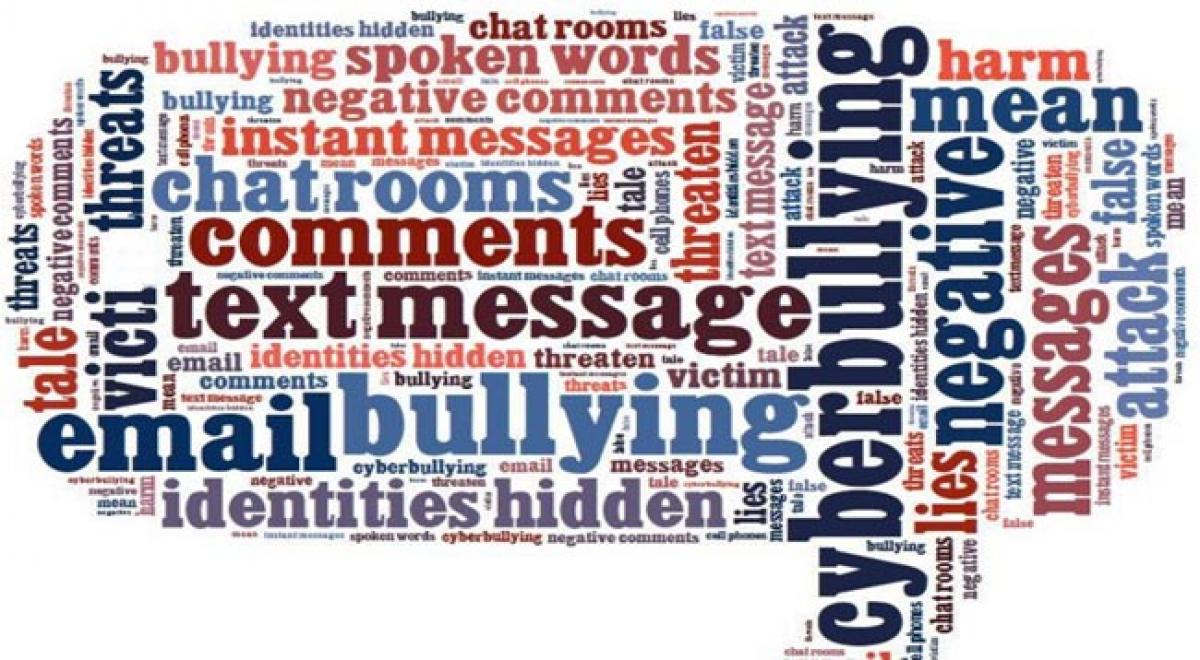Live
- Prateeksha Srivastava says she seldom meets fellow music composers Rusha, Blizza, in person
- KTR Accuses Government of Brutality Against Farmers, Calls for Immediate Action
- Manchu Manoj Attends Shooting Amid Family Controversy
- BWF World Tour Finals: Treesa-Gayatri defeat Malaysian pair to keep semis hopes alive
- MUDA case: Complainant Krishna asks Lokayukta to file new plaint on CM Siddaramaiah on ED’s report
- Airport capex in India to cross Rs 60,000 cr in fiscals 2025-2027 to handle growing traffic: Crisil
- Five-Year-Old Boy Dies After 55-Hour Rescue from Borewell in Rajasthan's Dausa
- Chaos in Parliament over Congress-George Soros link claims, BJP MP poses questions
- Bus Driver Arrested After Deadly Accident in Mumbai’s Kurla; 42 Injured
- Community lunch, a ritual to prevent drought in Adoni
Just In

Sadly, social media is turning out to be an easy platform for cyber-bullying.
New Delhi: If you thought that only the victims of cyber-bullying are prone to suffer from depression and anxiety, think again. Psychologists have warned that the bullies themselves could be covertly depressed and anxious.
"Most of them experience an inferiority complex and demean themselves or may even be covertly depressed or anxious," city-based psychologist Ripan Sippy told IANS.
Take the case of 18-year-old Vikram Mahajan (name changed). Now in his first year of college, he used to cyber-bully his school friends as his family environment was not cordial. He never had the chance of expressing the emotional turmoil that he went through and finally took shelter in cyberspace to give vent to his stress.
In another instance, 15-year-old Anjali Chauhan (name changed), a social introvert, became emotionally disturbed after she was teased and bullied on the social media for expressing her liking for a particular actress, who was considered "lame" by the persons bullying her.
Sadly, social media is turning out to be an easy platform for cyber-bullying.
"On social media, people develop inflated self-concepts as they compensate their inferiorities with 'intellectual' reasoning and views on a uniform platform with the e-world," Sippy said.
With young adults and teenagers spending more time in the virtual world, becoming a victim of cyber-bullying has become increasingly common.
"The cyber world is now a prominent and common social milieu for communication and social interactions; so bullying finds its place here as well. Sometimes, the anonymity it provides like in trolling adds more to the armoury of the bully," Samir Parikh, Director, Mental Health and Behavioural Sciences, Fortis Healthcare, told IANS.
What then is cyber-bullying? Intimidating, dominating or purposefully irritating for pleasure; bossing, directing or criticising others or their views, lifestyle or personal preferences in the virtual world; and Twitter trolling are some examples.
The practice revolves around one who bullies and the one who is being bullied.
Bullies are generally unable to express their views in a real-life scenario. They are generally considered insignificant and weak by their peers or others around. Therefore, they feel elated and try to live a fantasy ideal utopian life through cyber-bullying.
"They end up bullying because on social media platforms, they are able to act anonymously where others generally are unaware of their inferiorities, shortcomings or hidden emotional problems," Sippy said.
The victim, on the other hand, fears social ridicule and being exposed as a weak person in front of everyone.
"The fear of negative social evaluation grows in them and may even lead to clinical depression or anxiety disorder. They may gradually withdraw or limit self-expression for fear of being shamed again or facing similar unpleasant experiences as in the past," Sippy suggested.
Suicides have considerably increased in the past few years owing to cyber-bullying as the victims are unable to cope with the public shame and depression.
"The victims, at times, feel socially shamed or fearful when unable to defend themselves on an open public platform. They feel that they are incapable of self defence and hence feel anxious and inferior, often forcing them to commit suicide," Sippy added.
Cyber-bullying can even bring behavorial and psychological changes in both the perpetrator and the victim.
"One who bullies may become aggressive, become less concerned for others' feelings, remain secretive about online activities and spend long hours online. They may even become upset if he/she cannot use the computer (temporarily)," said Ashima Srivastava, Consultant Clinical Psychologist, Max Super Speciality Hospital, Patpargunj.
For victims, it is the suicidal thoughts and attempts that appear first.
"The victim shows unwillingness to share information about online activity and appears nervous when receiving a text message, email, or Instant Message. One could abruptly shut off the computer/laptop or walk away mid-use and withdraw from friends and family in real life. Sleepless nights and unexpected weight loss or gain are some other symptoms," Srivastava said.
All the health experts suggested that creating awareness about cyber-bullying is the first step to reduce its growth and effects, followed by counselling.
"Facebook, Twitter, etc., should also be made accountable by making them keep a check on bullying material once they are reported as objectionable to them," Sippy suggested.

© 2024 Hyderabad Media House Limited/The Hans India. All rights reserved. Powered by hocalwire.com







